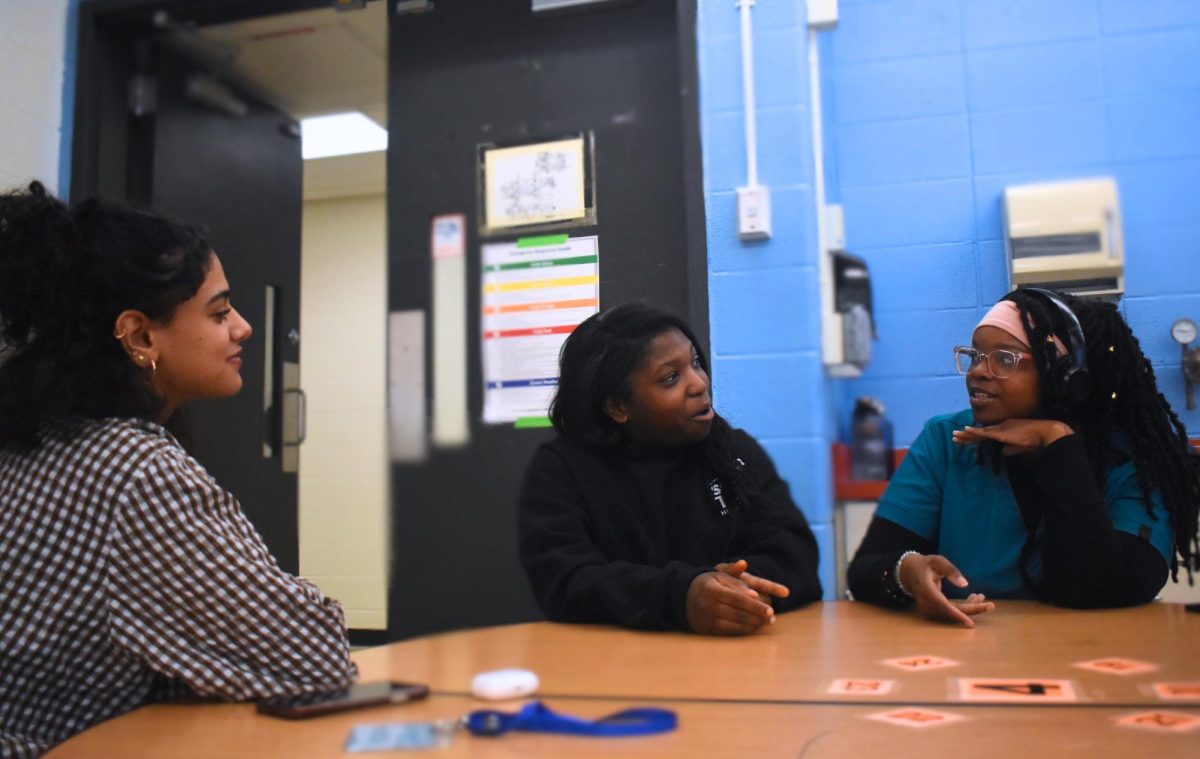Kamala or Trump. Democratic or Republican. Pro-choice or Pro-life. As campaigning for the 2024 presidential election reaches its end, society is left more polarized than ever before. With over 81% of citizens contending that the country is more disjointed than united, itŌĆÖs not all too surprising that politics has reared its way into various endeavors: literature, sports and even mainstream media.┬Ā
The one place it has yet to appear? Conversation. Whether it be at school, family dinners, or even casual discourse with colleagues, talking about the state of our government has long been the elephant stomping through rooms of public interaction. WeŌĆÖve collectively deemed it rude to speak on the issue and have repeatedly condemned those who do anything but accept the status quo.┬Ā
ŌĆ£WeŌĆÖre so conditioned to not talk about politics that when people actually do, it blindsides me. IŌĆÖve been trying to deliberately have those talks with my friends and my siblings, but it doesnŌĆÖt come naturally,ŌĆØ senior Jamie Tiemeier said.
Though some may say this has become the norm to avoid conflict and confrontation ŌĆö a product of too many lively debates gone wrong ŌĆö weŌĆÖve instead grown accustomed to pushing disagreements under the rug and placing a lid on an already overflowing pot to maintain peace. The unintended consequence that has emerged is the reason that the power of democracy as we know it is currently in jeopardy; from a country built off of the voices and perspectives of diversity to a reality where over half of the population censors political beliefs around one another, our progress over the past 248 years has been retroactive, thus detrimental to our future as a united nation.
The ramifications that come about from this are three-fold. First, we create a society that doesnŌĆÖt know how to have hard conversations with one another. Generations upon generations have instilled the habit of staying silent, so much so that those who want to go against the tide donŌĆÖt know how to within the status quo. Gen Z is on track to be the most politically involved demographic in quite some time, however; without a safe outlet, knowledge of respectful discourse or the ability to separate a person from their views, we turn opportunities for progress into toxic spaces that turn people away from public forums.
An absence of the aforementioned space is a primary cause of the second implication to come forth. Living in one of, if not, the most prominent ages of technology where over 5 billion people consider themselves social media users, echo chambers have increasingly become one of the most dangerous aspects of being online. Users are sent down rabbit holes propagating a partyŌĆÖs view while censoring content related to the other ŌĆö now, how do platforms like Instagram, TikTok and Facebook figure out which side to advertise? The answer lies in the algorithms the apps use to track individualsŌĆÖ interests through likes, saves and shares. All it takes is rewatching a video or sending a photo to a friend to prescribe susceptible minds to potentially harmful media that could have detrimental effects on their political views, broader worldview and mental health.
ŌĆ£I clicked on a [post] my friend reposted on Instagram; then, all of a sudden, I saw so much content about the election from [that side]. I didnŌĆÖt interact with any other posts so it cleared up pretty quickly, but itŌĆÖs super easy to get caught up in one topic and stay focused on it,ŌĆØ senior Rachel Brazier said. ŌĆ£I can see how it could be dangerous, and it worries me because so many young people are online and look at things that could lead them down the wrong path.ŌĆØ
Echo chambers are especially hurtful to the growth of open conversations as they allow hate speech, cyberbullying and fake rhetoric. When one person is overwhelmingly surrounded by one view, they adopt it as their own without clear rationale and thatŌĆÖs precisely the issue society faces. The solution isnŌĆÖt to keep everyone away from technology, however; online platforms have the potential to foster productive conversation where a large variety of perspectives can find a middle ground. An easy fix may come from limiting the intensity to which algorithms impact what we consume or even utilizing the programs in different ways. But in the short run, the most feasible way to avoid being caught in a social media trap is to know itŌĆÖs happening in the first place which, once again, stems from having genuine interactions with our youth regarding these things.
The third and final consequence to be aware of is just how far polarization has impacted society. An outcome of the two former effects, the divide that has plagued the countryŌĆÖs political landscape for decades is nearly the worst it has ever been. Due to our avoidance of face-to-face interactions, people can resort to hiding behind screens to confront those with varying opinions; we dehumanize those across the aisle in an attempt to validate our own views.┬Ā
Constantly viewing others as the enemy is a breeding ground for more conflict, divide and stalemates such as the ones that have littered Congress for years now. We cannot see change until we learn to collaborate, cooperate and compromise. Current officials have realized the issue, implementing a different approach derived from the future: future voters, future candidates and future policy. Teaching our youth to respectfully partake in their environment is vital to the success of our nation. We have the capacity to change the direction United States politics goes in, all it takes is being open to having a talk.




![Sitting courtside before a junior varsity girlsŌĆÖ tennis match, senior Tanisi Saha rushes to finish her homework. Saha has found herself doing academic work during her athletic activities since her freshman year. ŌĆ£Being in sports has taught me how to stay organized and on top of my schoolwork. [With] a busy practice and game schedule, IŌĆÖve learned to manage my homework and study time better,ŌĆØ Saha said.](https://pwestpathfinder.com/wp-content/uploads/2025/11/DSC_0022-1200x800.jpg)
![Sophomore Maryem Hidic signs up for an academic lab through Infinite Campus, a grading and scheduling software. Some students enjoyed selecting their responsive schedule in a method that was used school-wide last year. ŌĆ£I think it's more inconvenient now, because I can't change [my classes] the day of, if I have a big test coming and I forget about it, I can't change [my class],ŌĆØ sophomore Alisha Singh said.](https://pwestpathfinder.com/wp-content/uploads/2025/10/DSC_0012-1200x801.jpg)
![Senior Dhiya Prasanna examines a bottle of Tylenol. Prasanna has observed data in science labs and in real life. ŌĆ£[I] advise the public not to just look or search for information that supports your argument, but search for information that doesn't support it,ŌĆØ Prasanna said.](https://pwestpathfinder.com/wp-content/uploads/2025/10/DSC_0073-2-1200x800.jpg)
![Junior Fiona Dye lifts weights in Strength and Conditioning. Now that the Trump administration has instituted policies such as AI deregulation, tariffs and university funding freezes, women may have to work twice as hard to get half as far. "[Trump] wants America to be more divided; he wants to inspire hatred in people,ŌĆØ feminist club member and junior Clara Lazarini said.](https://pwestpathfinder.com/wp-content/uploads/2025/05/Flag.png)
![As the Trump administration cracks down on immigration, it scapegoats many immigrants for the United StatesŌĆÖ plights, precipitating a possible genocide. Sophomore Annabella Whiteley moved from the United Kingdom when she was eight. ŌĆ£ItŌĆÖs pretty scary because IŌĆÖm on a visa. When my visa expires next year, IŌĆÖm not sure whatŌĆÖs going to happen, especially with [immigration] policies up in the air, so it is a concern for my family,ŌĆØ Whiteley said.](https://pwestpathfinder.com/wp-content/uploads/2025/05/DSC_0077-7copy.jpg)
![Shifting global trade, President Donald TrumpŌĆÖs tariffs are raising concerns about economic stability for the U.S. and other countries alike. ŌĆ£[The tariffs are] going to pose a distinct challenge to the U.S. economy and a challenge to the global economy on the whole because it's going to greatly upset who trades with who and where resources and products are going to come from,ŌĆØ social studies teacher Melvin Trotier said.](https://pwestpathfinder.com/wp-content/uploads/2025/05/MDB_3456-1200x800.jpg)



![Some of the most deadly instances of gun violence have occurred in schools, communities and other ŌĆśsafe spacesŌĆÖ for students. These uncontrolled settings give way to the need for gun regulation, including background and mental health checks. ŌĆ£Gun control comes about with more laws, but there are a lot of guns out there that people could obtain illegally. What is a solution that would get the illegal guns off the street? We have yet to find [one],ŌĆØ social studies teacher Nancy Sachtlaben said.](https://pwestpathfinder.com/wp-content/uploads/2025/01/DSC_5122-1200x800.jpg)

![Sophomore Shree Sikkal Kumar serves the ball across the court in a match against Lindbergh. Sikkal Kumar has been a varsity member of the varsity girlsŌĆÖ tennis team for two years, helping her earn the number two rank in Class 2 District 2.ŌĆ£When matches are close, itŌĆÖs easy to get nervous, but I [ground] myself by[staying] confident and ready to play,ŌĆØ Sikkal Kumar said.](https://pwestpathfinder.com/wp-content/uploads/2025/11/DSC2801-1200x798.jpg)
![Dressed up as the varsity girlsŌĆÖ tennis coach Katelyn Arenos, senior Kate Johnson and junior Mireya David hand out candy at West HighŌĆÖs annual trunk or treat event. This year, the trunk or treat was moved inside as a result of adverse weather. ŌĆ£As a senior, I care less about Halloween now. Teachers will bring their kids and families [to WestŌĆÖs Trunk or Treat], but there were fewer [this year] because they just thought it was canceled [due to the] rain. [With] Halloween, I think you care less the older you get,ŌĆØ Johnson said.](https://pwestpathfinder.com/wp-content/uploads/2025/10/DSC00892-1-1200x800.jpg)
![Focused on providing exceptional service, sophomore Darsh Mahapatra carefully cleans the door of a customerŌĆÖs car. Mahapatra has always believed his customers deserve nothing less than the best. ŌĆ£[If] theyŌĆÖre trusting us with their car and our service, then I am convinced that they deserve our 100 percent effort and beyond,ŌĆØ Mahapatra said.](https://pwestpathfinder.com/wp-content/uploads/2025/10/DSC_0018-1200x800.jpg)
![Sophomore Aleix Pi de Cabanyes Navarro (left) finishes up a soccer game while junior Ava Muench (right) warms up for cross country practice. The two came to Parkway West High School as exchange students for the 2025-2026 school year. ŌĆ£The goal for the [exchange] program is to provide opportunities for both Parkway students and our international exchange students to learn about other cultures, build connections and become confident, capable, curious and caring ŌĆö ParkwayŌĆÖs Four CŌĆÖs ŌĆö in the process,ŌĆØ Exchange Program Lead Lauren Farrelly said.](https://pwestpathfinder.com/wp-content/uploads/2025/10/Feature-Photo-1200x800.png)
![Leaning on the podium, superintendent Melissa Schneider speaks to Parkway journalism students during a press conference. Schneider joined Parkway in July after working in the Thompson School District in Colorado. ŌĆ£My plan [to bond with students] is to get things on my calendar as much as possible. For example, being in [classes] is very special to me. I am trying to be opportunistic [meeting] kids [and] being in [the school] buildings. I have all the sports schedules and the fine arts schedules on my calendar, so that when I'm available, I can get to them,ŌĆØ Schneider said.](https://pwestpathfinder.com/wp-content/uploads/2025/09/IMG_5425-1200x943.jpeg)
![Gazing across the stage, sophomore Alexis Monteleone performs in the school theater. The Monteleone familyŌĆÖs band ŌĆ£Monte and the MachineŌĆØ has been releasing music since 2012, but Alexis started her own solo career in 2024 with the release of her first single, Crying Skies. ŌĆ£My whole family is very musical, [and I especially] love writing [songs with them],ŌĆØ Monteleone said.](https://pwestpathfinder.com/wp-content/uploads/2025/09/DSC7463-1200x798.jpg)

![Leaping through the air, senior Tyler Watts celebrates his first goal of the season, which put the Longhorns up 1-0 against the Lafayette Lancers. Watts decided to play soccer for West for his last year of high school and secured a spot on the varsity roster. ŌĆ£[Playing soccer for West] is something I had always dreamed of, but hadnŌĆÖt really had a good opportunity to do until now. ItŌĆÖs [really] fun being out [on the field], and IŌĆÖm glad I decided to join the team. ItŌĆÖs just all about having fun with the boys and enjoying what time we have left together,ŌĆØ Watts said.](https://pwestpathfinder.com/wp-content/uploads/2025/09/DSC_1951-1200x855.jpg)


Abi Roth • Oct 11, 2024 at 3:25 pm
What a great, thought out article!